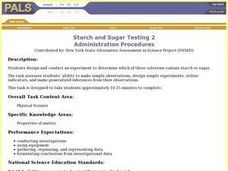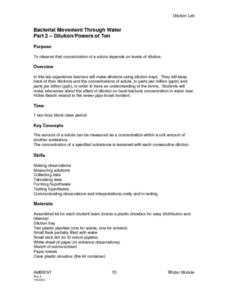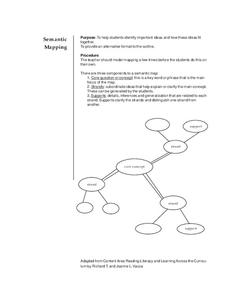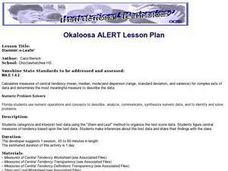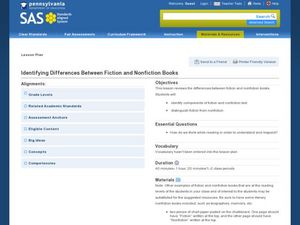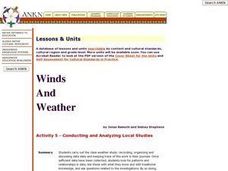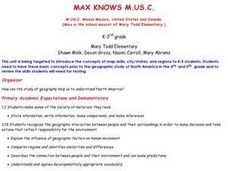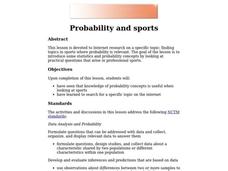Curated OER
Sound Box
Students make simple observations and identify relevant variables, such as frequency and diameter. They then discuss the relationship between variables. The task assesses students' abilities to make simple observations and make...
Curated OER
Starch and Sugar Testing 2
Students design and conduct an experiment to determine which of three solutions contain starch or sugar. This task assess students' ability to make simple observations, design simple experiments, utilize indicators, and make generalized...
Curated OER
Bacterial Movement Through Water Part 2- Dilution/Powers of Ten
Students make dilutions using dulution trays. They keep track of their dilutions and the concentrations of solute, to parts per million (ppm) and parts per billion (ppb), in order to have an comprehension of the terms. Students make...
Curated OER
Semantic Mapping
Students explore semantic mapping. Through teacher modeling and independent practice they complete a variety of semantic (concept) maps to coincide with specific areas of subject matter. They identify the core concept and include...
Curated OER
Stemmin'-n-Leafin'
Learners make stem and leaf charts to determine the measures of central tendency using test score data. They analyze the data to draw inferences which they share with the class. They complete the associated worksheets.
Curated OER
Introduction to the Scientific Method
Young scholars designs and conduct a scientific experiment that identifies the problem, distinguishes manipulated, responding and controlled variables, collects, analyzes and communicates data, and makes valid inferences and conclusions.
Curated OER
What Makes you Hot?
Learners manipulate different variables in a model and make inferences about the temperature on Earth. In this heat lesson students calculate the blackbody radiation of an object at a certain temperature.
Curated OER
Rhetorical Devices
Twelfth graders identify and analyze examples of rhetorical devices as valid or invalid inferences. In this text analysis lesson, 12th graders research a controversial topic in teams and identify rhetorical devices for the topic....
Curated OER
Catches and landed value of fish
Students analyze data. In this secondary mathematics lesson, students read and retrieve data from a statistical table on the Canadian fishing industry. Students interpret and describe data in mathematical terms and make inferences and...
Curated OER
Identifying Differences Between Fiction and Nonfiction Books
Young scholars explore the differences between fiction and non-fiction book. In this genre study instructional activity, students read examples of fiction and non-fiction and identify the characteristics of each genre. Young scholars...
Curated OER
Immigration/Migration
Sixth graders investigate the immigration into America by researching Ellis Island. In this United States History lesson, 6th graders research the Internet to view photographs and find information about the immigration to Ellis Island....
Curated OER
Conducting and Analyzing Local Studies
Students carry out the class weather study: recording, organizing and discussing data daily and keeping track of this work in their journals. They look for patterns and relationships in data, link these with what they know and with...
Curated OER
Remembering September 11
Students explore the impact of September 11 on American society through analysis of interviews and class discussions. Students evaluate the historic importance of the Gettysburg Address.
Curated OER
Species Interactions
Students study the scientific concepts of biodiversity and conservation through the use of basic equations of population growth and hands-on experiments/simulations. The lesson includes a take-home assignment which can be used for final...
Curated OER
Max Knows Mexicao, United States and Canada
Learners utilize their map skills to explore the regions of North America. They explore the physical characteristics and climates of the regions. Students label their map and prepare a presentation of their findings.
Curated OER
Keep It Cool
Pupils complete a science experiment to study insulation, heat transfer, and permafrost. In this permafrost study lesson, students design and test a soda insulator. Pupils graph their class data and discuss the results. Students discuss...
Curated OER
Arctic cleanup
Ninth graders examine pollution problems and how it affects the community. In this arctic cleanup lesson plan students study ocean currents and how they affect pollution.
Curated OER
Chocolate and Ice Cream Across the Curriculum
Sixth graders in a special education class discuss excerpts of two stories and read biographical information on the authors. In groups, they read the full text of both stories and try to solve the mystery as they read. They practice...
Curated OER
Probability and Sports
Students research topics on the internet where probability is relevant. Students study statistics and probability concepts by looking at practical questions that arise in professional sports.
Orange County Department of Education
Integrity and a Boy Called Slow
Fifth graders identify the character trait of integrity in the main character, Slow, in "A Boy Called Slow." They participate in a discussion to determine what steps the main character took to earn his new name. Students write an essay...
Curated OER
The Cycle of Life
Eighth graders search for rites of passage in their own lives and study rites of other cultural groups in Louisiana and around the world. They assess how to recognize moments of importance in people's lives and find meaning in the stages...
Curated OER
Philadelphia Museum of Art
Students study paintings and use their knowledge of story elements to analyze the art. In this art analysis instructional activity, students review a novel for its elements. Students study the image At the Moulin Rouge: The Dance and...
Curated OER
Make a Snowflake
Students study the design of snowflakes. In this snow lesson, students discover the different shapes of a snowflake, and their similarities. Students study snowflakes outside, then create their own with popsicle sticks and glue.
Curated OER
Worming Your Way Through the Soil
Students study soil, living and non-living particles in the soil, and learn about composting. In this soil study lesson, students study soil samples and discuss the living and non-living components of the soil. Students classify the...
Other popular searches
- Teaching Inference Skills
- Inference Skills First Grade
- Reading Inference Skills
- Powerpoint Inference Skills
- Inference Skills in Reading
- Inference Skills Worksheet
- Science Inference Skills
- Inference Skills Sixth Grade



